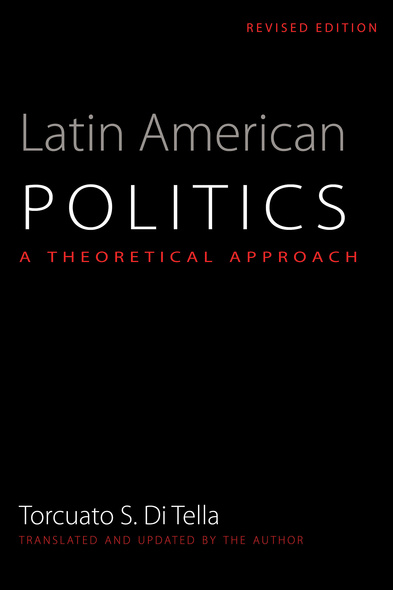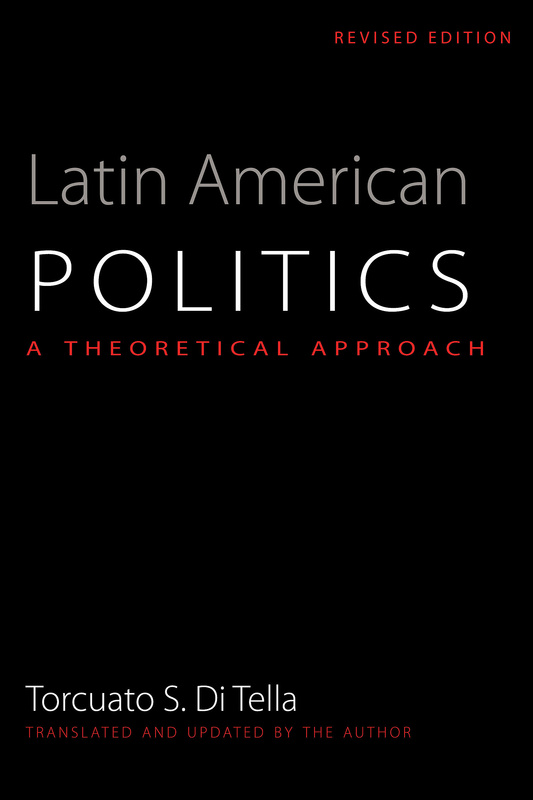Latin American Politics
A Theoretical Approach
First published in English in 1990 as Latin American Politics: A Theoretical Framework, a translation of Torcuato S. Di Tella's original Sociología de los procesos políticos, this new edition also focuses on the prerequisites for democracy in any society and on the role of the popular classes in social change. Di Tella draws on the work of Montesquieu, Burke, Tocqueville, Marx, Weber, and Durkheim in formulating his explanatory theories. These theories are then tested against crucial events in Latin American history—from the rebellions of the eighteenth century to the caudillos of the nineteenth century and the militarism of the twentieth century.
This edition is more attuned to an English-speaking audience, with a new chapter addressing the historical process in Argentina from the 1930s to 2000. Latin American Politics is written in a style easily accessible to the general reader or student, while its emphasis on the growth of democracy in Latin America makes it particularly timely.
Torcuato S. Di Tella is Professor of Sociology at the University of Buenos Aires. He has also been a visiting professor at Columbia University, the University of Texas at Austin, and Stanford University.
- Preface and Acknowledgments
- 1. The Study of Latin American Politics
- The Fall and Rise of Democracy
- Sociological Laws and Historical Processes
- The Program to Be Developed
- 2. Tensions in the Class Structure: From Social Mobilization to Autonomous Organization
- The Social Pyramid
- Social Mobilization and Mobilizationism
- Factors Triggering a Mobilizational Coalition
- Populism as a Type of Mobilizational Coalition
- Populism as a Stage in the Development of a Party Bipolarity
- 3. Actors and Coalitions
- Social Actors as Collective Entities
- Political Weight
- The Church and Armed Forces: Effective and Normative Noninvolvement
- The State as an Autonomous Actor
- Intellectuals and Political Elites
- Coalitions
- Multiclass Integrative Parties: The Mexican Case
- 4. Violence and Revolution
- The Motivational Structure at the Level of the Individual
- The Structural Approach: Violence and Revolution
- Mass Society
- Violence, Repression, and Legitimacy
- The Level of Menace: Historical Comparisons
- 5. Military Interventionism
- The Military Role: Omnipotence or Illusion?
- Aristocratic Control: Nineteenth-Century Brazil
- Military Reformism: Tenentismo and Ibañismo
- The Military-lndustrial Convergence in Argentina
- From Moderating Role to Transformative Intervention
- 6. Socialist Labor Parties: The Early Experience
- The Problem of Organization: Militants and Bureaucrats
- Socialist Labor Parties
- The Contrast between Chilean and Argentine Social Structures
- The Peculiarity of the Impact of Immigration in Argentina
- The Intellectuals of the Labor Movement
- The EarlyArgentine Political Party System
- Authoritarian Populism in Chile: The First Ibáñez Experience
- 7. Varieties of Populism and Their Transformative Tendencies
- "Aprista" or Middle-Class Populist Parties
- Social-Revolutionary Parties
- "Peronist" or Populist Labor Parties
- The Co-optation of the Labor Movement in Argentina
- The Changed Cultural Milieu of the Working Class
- Argentine Industrialists and the Peronist Elite
- Peronism and Varguismo Contrasted
- The Relevance of the Party System
- 8. A Modeled Historical Sequence: Argentina, 1938-2000
- Period 1. Stable Situation before "Times of Troubles" (1938-1939)
- Period 2. Tensions and Menaces on the Increase (1942-1944)
- Period 3. Rise of Peronism and Its Access to Power (1944-1946)
- Period 4. Breakup of the Peronist Coalition (1954-1955)
- Period 5. The "Impossible Game" (1958-1976)
- Period 6. Unstable Dictatorship (1976-1982)
- Period 7. Breakup of the "Proceso" Coalition, Rise of Alfonsinismo (1982-1984)
- Period 8. The Menemista Transformation of Peronism (1991-1998)
- Period 9. Breakup of the Menemista Coalition, Alianza Access to Power (1998-1999)
- Period 10. Right-Left Bipolarity: The End of "Argentine Exceptionalism"? (2000-?)
- Notes
- Bibliography
- Index





